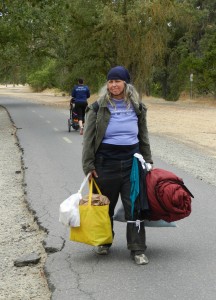
No one really expected the two recent town meetings about homelessness in Stanislaus County would produce immediate solutions. Newspaper accounts have stressed the anger and frustration of local residents as they see their streets and parks overrun with people with nowhere else to go. Many are ready to write off the homeless as low-life addicts, thieves, and vandals.
But the real story may be among those who’ve managed to listen closely to alternate views. Those who’ve paid attention have heard subdued but passionate discussion among people willing to look at causes rather than effects.
Consider the mentally ill. Legend has it Ronald Reagan pushed them into the streets, but in fact the consensus among experts when Reagan was Governor of California was that we didn’t need to institutionalize the mentally ill because modern drugs would enable them to live relatively normal lives. Governor Reagan, like many others, acted on professional advice. We now know the experts were wrong, but our wrong-headed policy remains in place today and so do multitudes of people who are on the streets because they can’t take care of themselves.
Many people are also willing to acknowledge that when a country sends tens of thousands of jobs to China, India, Pakistan, Mexico, and points beyond, the result is fewer jobs for its own citizens. And when many of the remaining jobs are at a minimum wage of $9 an hour, it doesn’t take higher math to know that even at 40 hours a week one can’t afford local housing when landlords impose a “thirty-three percent of income” requirement for rent.
In fact, according to Modesto’s own Department of Economic Development, average rent in Modesto is $829 a month. At that rate, those who work full-time must make at least $15.30 an hour to qualify for the thirty-three percent formula. Minimum wage earners must seek subsidized housing or find roommates willing to share expenses.
At both meetings, a constant theme among local church members, shelter workers, volunteers, and social workers was, “lack of capacity.” We don’t have enough beds for people, many of whom are mentally ill, disabled, unable to find affordable housing, or unable to find work.
Even if we did have capacity, anyone who’s ever tried to negotiate the labyrinthine maze of social services would soon agree that if it’s that difficult for someone with a home, transportation, and education, it’s near impossible for anyone lacking even one of the three.
We all agree that family values are crucial elements in the growth of successful and self-reliant individuals, but many of us thank God we didn’t suffer the fate of those people on the streets whose parents were addicted, abusive, criminal, and otherwise unfit. There’s a big difference between being born on third base and being born with three strikes. The majority of us have had the good fortune to get an opportunity at bat with enough good coaching to make it home. Others have not been as lucky.
Go out and talk to homeless people and you will hear horrific stories of abuse, rape by family members and neighbors, recruitment into crime, and introduction to drugs during childhood.
You will also meet people who talk to the alligators that live in Dry Creek. You will listen to people convinced they lost their automobiles when their steering wheels were “hacked” by a group of conspirators, including Modesto’s Chief of Police.
You will see physically disabled people like Scottie Shovelski pushed out of the homeless shelter on a daily basis and left to wander the streets, each step a Herculean effort. Yes, there are addicts, users, and dealers, but even many of them are far more pathetic than dangerous.
Some homeless people do get a monthly check and use it on drugs. Others routinely have their money taken by despicable predators who seek out the weakest and most vulnerable among us, knowing almost no one will come to their defense.
And while fear, loathing, and anger still dominate much public discourse, there’s also a growing conversation about finding humane solutions for homelessness, including strong support for the “Housing First” movement so successfully implemented by the state of Utah. There’s even stronger support for temporary remedies like providing access to shelter in abandoned buildings, allowing tent camping in sanctioned areas, or using vacant lots for mini- and micro homes.
While there’s still more than enough anger and loathing about homelessness, there’s also a deep-felt desire to help. Modesto and Stanislaus County’s civic leaders have always bragged about their region’s “good people.” Now more than ever, they should let the best ideas among us lead the way to humane solutions for people in need.

Your series on Modesto’s homeless is so full of poignant phrases about a subject really difficult to see and describe.
You present, explain, and do not condemn. These are truly gems. Thank you for this new emphasis in the Valley Citizen.
Thank you Richard. More to come.